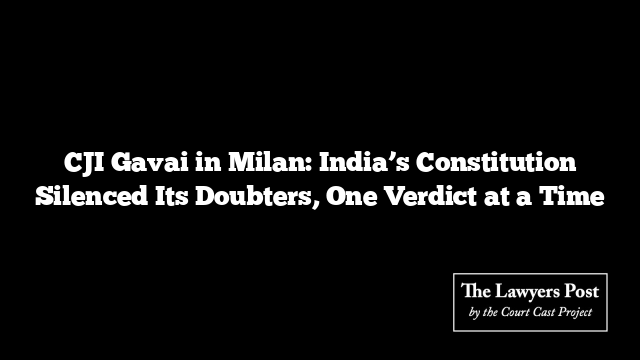Standing before an audience at the Milan Court of Appeal, Chief Justice of India BR Gavai didn’t just defend the Indian Constitution — he declared its critics decisively defeated.
Referring to early Western skepticism, particularly a 1951 remark by Sir Ivor Jennings who dismissed the Constitution as “too long, too rigid, too prolix,” Gavai struck back with the quiet force of 75 years of democratic persistence. “Experience has proven Sir Jennings wrong,” he said, “The Indian Constitution has not only survived — it has led a social revolution.”
He called it more than a governing document — a “revolutionary statement” that dared to rewrite history by making socio-economic justice not just aspirational, but actionable.
At the heart of this transformation, Gavai emphasized, are the Directive Principles of State Policy. Once mere guidelines, these have evolved — via judicial ingenuity and legislative courage — into enforceable rights. Education, livelihood, and legal aid: all, according to him, born from the fusion of Parliament’s intent and the judiciary’s interpretive will.
From courtroom precedents like MH Hoskot to Olga Tellis to Bandhua Mukti Morcha, the Constitution’s voice has spoken clearly in favor of the marginalized. “No person can live without the means of living,” Gavai reminded, quoting Olga Tellis. In Bandhua Mukti Morcha, the judiciary confronted the grim reality of bonded labour — and gave the Directive Principles teeth.
He also drew attention to landmark legislative interventions. The First Amendment of 1951, he said, wasn’t just a tweak — it was a political thunderclap. With it came Article 15(4) and the Ninth Schedule, shielding affirmative action and land reforms from being strangled in the courts.
Gavai reflected on the judicial turning point: the Kesavananda Bharati judgment. With it, the Court declared Parliament powerful — but not omnipotent. The “basic structure” doctrine was born, preserving the soul of the Constitution against the threat of overreach.
Quoting Ambedkar’s call for social and economic democracy — and invoking Gandhi’s dream to “wipe every tear from every eye” — Gavai drew the arc of the constitutional journey toward a deeply personal end.
“I come from a historically marginalised background,” he said, “and I stand here today as a product of constitutional promise.”
The critics called it impossible. India’s Constitution, it turns out, just needed time to prove them wrong.





